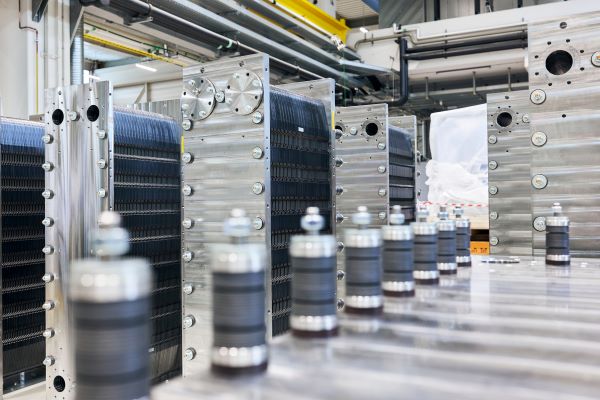Proton exchange membrane (PEM) electrolyzer expected to produce up to 8,000 metric tons of hydrogen per year

The core elements of hydrogen electrolysis are these so-called "stacks". These are currently being manufactured in Siemens Energy's new gigawatt factory in Berlin. BASF is one of the first customers to be supplied from the new gigawatt factory. Copyright: Siemens Energy
With the approval of funding from the German Federal Ministry for Economic Affairs and Climate Action and the State of Rhineland-Palatinate, BASF has come a major step closer in building a proton exchange membrane electrolyzer. In cooperation with Siemens Energy, work on the water electrolysis at the Ludwigshafen site – the so-called Hy4Chem-EI project – is now entering the next phase of construction.
Dr. Franziska Brantner, Parliamentary State Secretary at the Federal Ministry for Economic Affairs and Climate Action, presented the official notification of funding to Dr. Melanie Maas-Brunner, member of the Board of Executive Directors of BASF SE and Site Director Ludwigshafen, in the presence of Malu Dreyer, Minister-President of Rhineland-Palatinate.
With an output of 54 megawatts (MW) and a capacity of up to 8,000 metric tons of hydrogen per year, the PEM electrolyzer will be one of the largest of its kind in Germany once it is operational. Powered using electricity from renewable energy sources, the system will produce CO2-free hydrogen and thereby reduce greenhouse gas emissions at the site by up to 72,000 metric tons annually.
BASF will primarily use this hydrogen as a raw material in the manufacture of products with a reduced carbon footprint. In addition, the company will supply hydrogen for mobility in the Rhine-Neckar Metropolitan Region to support the ramp-up of a hydrogen economy in the area.
BASF and Siemens Energy plan to begin operating the water electrolysis plant in 2025. In cooperation with the State of Rhineland-Palatinate, the German Federal Ministry for Economic Affairs and Climate Protection is contributing up to €124.3 million to the project – up to €37.3 million of which will be financed by the government of Rhineland-Palatinate.
Dr. Melanie Maas-Brunner, member of the Board of Executive Directors of BASF SE and Site Director Ludwigshafen, said: “In chemical industry, our main need for low-carbon hydrogen is as a raw material. In the long term, it will also become increasingly important for BASF as an energy vector. That is why I am particularly pleased that our politicians have recognized the project’s potential. In Siemens Energy, we also have a partner with outstanding technological expertise at our side. The current funding commitment shows that politics and business are working together to shape the industrial sector’s energy transformation. This is both a milestone on the road to net zero carbon emissions and a sign of the Ludwigshafen site’s capabilities.”
Dr. Franziska Brantner, Parliamentary State Secretary at the Federal Ministry for Economic Affairs and Climate Action, commented: “I am delighted to present the funding notification for this pioneering project aimed at decarbonizing the chemical industry. As the largest project of its kind to date at a chemical site, it is a leading example of how we can achieve our climate targets. In this way, German companies are demonstrating how the hydrogen economy can become a reality and that carbon neutrality and future viability go hand in hand.”
Katrin Eder, Rhineland-Palatinate’s State Minister for Climate Protection, Environment, Energy, and Mobility: “Hydrogen technology will lead to a significant reduction in environmentally harmful greenhouse gases. Zero-emissions hydrogen also has many possible applications. As a raw material, as an energy carrier, and as an energy storage medium, climate-neutral hydrogen will make important contributions to the decarbonization of our economy and to ensuring a reliable supply of renewable energy. The development and market ramp-up of energy-efficient and cost-efficient hydrogen technologies are key steps toward establishing a sustainable hydrogen economy in Rhineland-Palatinate, across Germany, and throughout the EU. BASF’s Hy4Chem project will play an important role. Last but not least, this project will help us to support Rhineland-Palatinate as a center for business and our innovative strength in the long term.”
Subscribe to our newsletter & stay updated.